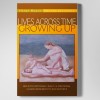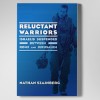Tuesday, August 8. 2006
Shrapnel
 Perched on my knee are two shrapnel, a gift from Yovel, the six year old I interviewed Friday in Kiryat Shemona during rocket fire. Two of three he found in his back yard, after the Katyusha hit the bright pastel rose painted kindergarten, catty corner from his house. One is a sphere fragment, fits my index finger tip. It has an organic-looking or geological studded convex surface, ragged edges; its concave side has a single ridge. It feels unfriendly even as I try capping my finger with it. The other, perhaps four by one cm, looks like a modern steel sculpture, a miniature fragment from something by David Smith, from inside his polished globes, with nefarious, studded innards. It has two sharp edges, striated with glistening, brass striations and a central ridge on each side, like some postmodern arrow head. Or some abstract sculpture of a sturgeon, thickened body, lateral lines, its dorsal and ventral “fins” are knife sharp, ridged; one end snub-nosed, the other its fishtail waving laterally.The car I saw on Eilat Street looked like a sieve, hit by shrapnel. Another took a direct hit, was burnt black. Still another took a hit through its rear windowD. is one of the soldiers who come to the triage center. All the soldiers are nonchalant about their injuries. D. has a laceration on his finger. Shrapnel. Just wants it cleaned, wrapped, so he can go back to artillery. He washes it himself, but lets Nurse Sarah bandage it carefully. On the back of his flak jacket, he has written his name in large black letters. Below this he has written this, which I read thrice:
Perched on my knee are two shrapnel, a gift from Yovel, the six year old I interviewed Friday in Kiryat Shemona during rocket fire. Two of three he found in his back yard, after the Katyusha hit the bright pastel rose painted kindergarten, catty corner from his house. One is a sphere fragment, fits my index finger tip. It has an organic-looking or geological studded convex surface, ragged edges; its concave side has a single ridge. It feels unfriendly even as I try capping my finger with it. The other, perhaps four by one cm, looks like a modern steel sculpture, a miniature fragment from something by David Smith, from inside his polished globes, with nefarious, studded innards. It has two sharp edges, striated with glistening, brass striations and a central ridge on each side, like some postmodern arrow head. Or some abstract sculpture of a sturgeon, thickened body, lateral lines, its dorsal and ventral “fins” are knife sharp, ridged; one end snub-nosed, the other its fishtail waving laterally.The car I saw on Eilat Street looked like a sieve, hit by shrapnel. Another took a direct hit, was burnt black. Still another took a hit through its rear windowD. is one of the soldiers who come to the triage center. All the soldiers are nonchalant about their injuries. D. has a laceration on his finger. Shrapnel. Just wants it cleaned, wrapped, so he can go back to artillery. He washes it himself, but lets Nurse Sarah bandage it carefully. On the back of his flak jacket, he has written his name in large black letters. Below this he has written this, which I read thrice:
“If your going to shoot a man, better hit him. If you hit him, better kill him. Because, if you don’t, he’ll try to kill you.”
A. another kid, is brought by the army doc. Dropped a five kilo hammer on his finger three days ago; wouldn’t tell anyone; doesn’t want to get sent back from the front. He’s sent for an X-Ray. No
break. He can go back to his unit. I mention, as I look at the old blood engorged under his fingernail, that we learned a trick to drain this if it is painful: heat a paper clip and poke a hole through the
nail. Doesn’t hurt and relieves the painful swelling. But, the soldier says, it doesn’t hurt. Then he’s off.
———
I get irritated at the Russian doc who takes care of the Russian fellow who arrives limping, arms around his buddies shoulders. The soldier, a father of two, belly straining at his belt, says he twisted his ankle yesterday. Off to X-Ray. Returns with an XRay of one ankle. The Russian doc takes over in Russian, then looks at me and says in Hebrew to the soldier, “Well, I guess we’ll have to talk the other language.” I reassure him, better to talk in Russian if the soldier is more comfortable. Certainly the doc seems more comfortable in Russian. Glances at the XRay and says, no fracture and is about to send him off with diagnosis of a strain. I become Dr. Butt-inski and look at the film again. Not clear that there is a fracture or not. I mention to Dr. “Russki” that when I trained in pediatrics, we would always XRay both limbs to compare them. He responds, maybe in pediatrics, and I confess to my pedicatricality. Dr. “Russki” sends the soldier home with his old, now filthy ace bandage and boot laced up. I ask “Where’s home ”
“Beersheva.”
“How’ll you get there”
“Bus.”
This is perhaps a 4 hour trip with no rockets, if the buses are running. He should be icing and elevating the leg. This seems quite wrong with me. I get an ice pack from the nurse, insist that his buddies ride him out with the wheel chair. But the soldier won’t put the ice pack inside his boot, and certainly won’t unlace his boot. He has two children to get home to, he says. When I return, Dr. “Russki” is checking the XRay again. Turns to me, as if to explain, “I’m a urologist, not an orthopedist.” I don’t tell him that I’m a shrink. Just leave it at that. But I do think that speaking Russian doesn’t make up for uncaring medical treatment.
————–
The shrink cases are varied. Some people simply have been in need for some time; the Katyushas and the open triage is a chance to get someone to care for them. My colleague, Chana is sitting on the
mattress on the floor in the front triage room, holding the hand of such an ancient, sad soul, her head leaning, nod wise to the right, openmouthed.
Hardly a word passes between them while I am there. Another sharp-featured, rail-thin lady is brought by a fellow worker. Both are from Tuba, the Arab or Druze village closer to Safed. She
fell at work, hit her head, she says. Now has pains down the rightside of her head, on her hip, leg and can’t stand or walk. Off to XRay she is sent by the urologist-who-isn’t-a-orthodpedist. Xray normal, she is ready to be sent off. Moans that she can’t stand, must see a neurologist. No neurologist hereabouts, so the shrink (me) is sent to talk with her. I ask her about herself, home, family, age and
such. Five brothers all married; she is thirty, living with her parents. And she doesn’t need a man, she insists. Catches herself here and eye-shoots me: “I know what you’re doing! You think this is
psychological. I need a neurologist.” A middle-aged fellow arrives, balding, a touch portly, carries himself with importance. Says he is taking responsibility for her, when I ask if he is related. I suggest
she see her doctor in Tuba. They ask for the XRay. Given. She moans as she is loaded onto her fellow worker. I port over the wheel chair so she can ride out. Learn later, she is a chronic psychiatric patient at Safed Hospital.
———
The former Southern Lebanese Army soldier, a Christian, arrives with piercing headaches, eye-stabbing feelings and whooshing in his ears. He is fit, closely-cropped hair, well-groomed. I remark on the two scars in his throat; unusual, in that it looks like he had two tracheotomies. He did, in 1996 and his tale unfolds.
He has returned from evacuating his wife and 4 yo to Hadera to live with the extended family. He can’t take the crowding there, he claims. But his 4 y.o. holds holds his index finger with her fist like
this (he shows me), for security. When the sirens wailed, he would shut the door to the secure room and she became hysterical. But what can he do?
He has returned from death. Here — he points to his cheek — he was shot in southern Lebanon: he shows me the entrance wound in the corner of his left lip. Took out his teeth, part of his tongue (he extends it briefly for a look), lodged in his right neck. 42 units of blood they used in Rambam Hospital. Several times he heard them say he was a lost cause. He was not supposed to survive. The Israeli doctor who had a bit of Arabic, explained things to him. For four months on the respirator, he could not talk.
He was engaged to be married one month before he goes to southern Lebanon. His fiancé is in Beirut. That was it. She disappears from his life.
Evacuated to Israel after the first Lebanese War, he meets another woman, builds a life. But his extended family lives in a kfar five kilometers from the border into Lebanon. He reached them once by cell phone, but they are afraid to talk, afraid of monitoring. Then, after he hears the evacuation orders by Israel to citizens of Southern Lebanon, he can no longer reach them. He worries.
In the first Lebanese War, he saw things he doesn’t want to remember. Men dying next to him. What can he do? He has enough of fighting. Then he was young. Now, he has a daughter, a wife. He returned to Kiryat Shemona and he has pains in his head, eyes, whooshing in his ears.
The Arab M.D. is asked to assess him. He takes a brief moment, hands him a prescription for ear drops. The pharmacies are all closed. The doctor says dismissively that he won’t use any of the E.R.’s supplies for this fellow.
The ex-soldier knows he has been treated disdainfully.
Chana Mann, my colleague explains that little love is lost between the Israeli Arabs and the former Southern Lebanese soldiers. They share a language, and barely that.
The ex-soldier winces at each boom of Katyushas, even in this secure bunker of an E.R. It is a reflex. I wonder if he returns to face memories and feelings that have burrowed within him, lurking.
He is in a no-man’s land, near to his home and faraway, in a land that has adopted him, even as his heart seems to remain in a small kfar — now silent — on the other side of the border.



